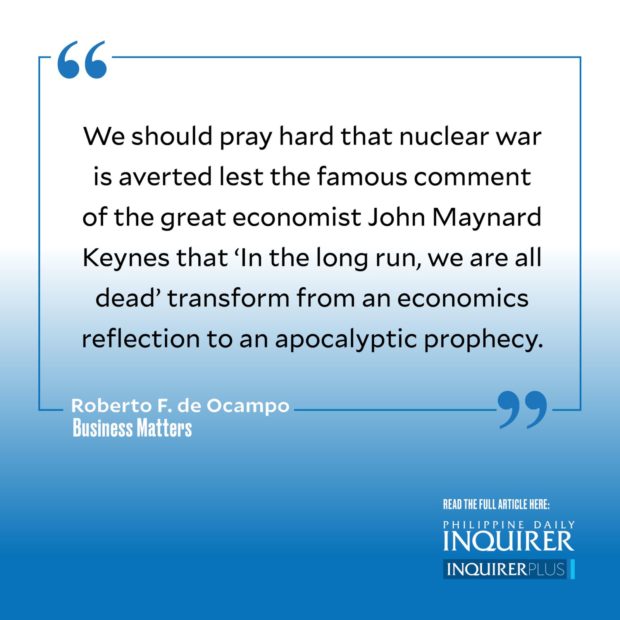Keynesian apocalypse
Many of those viewing the Russia-Ukraine war via multisourced reportage as far detached as possible from propaganda, disinformation, and inflammatory rhetoric from both sides of the conflict have advanced the following observations:
1. Russia started the war and thus broke international rules-based norms of conduct by invading a sovereign country and therefore bears the responsibility for the resulting deaths and destruction that are the casualties of any war, justifications based on citing other terrible wars—Vietnam, Afghanistan, or Iraq notwithstanding;
2. Nato bears a shared responsibility for how events have unfolded as Russia’s actions weren’t entirely unprovoked. Numerous sources relate the origins of provocation to the breaking of a promise forged under a well-documented “gentleman’s agreement” between then US President George H.W. Bush and Russian Premier Mikhail Gorbachev following the dismantling of the Soviet Union and the reunification of Germany, that Nato would cease to expand eastwards toward Russia as a precursor toward a lasting peace encompassing all of Europe plus Russia. But Nato proceeded despite vehement protests from Russia and dire warnings from American geopolitical luminaries including Henry Kissinger, Ambassador (to Russia) Jack Matlock, and renowned professor emeritus Noam Chomsky. Nato’s plan to add Ukraine to the alliance seems to have been the proverbial last straw for Russia which viewed a missile-armed adversarial Ukraine bordering Russia to be an existential threat to its national security much as the US had similarly viewed the installation of Russian missiles in Cuba during the Cuban missile crisis;
3. Economic sanctions against Russia will seriously affect it but so also Nato and the rest of the world since oil prices have begun to skyrocket and the cascading effect of this on the prices of all other prime commodities has begun to transpire.
4. A direct military confrontation between the two nuclear superpowers (US and Russia) must be avoided at all costs as it could spark a dreaded nuclear war that would threaten the existence of mankind. Already the Doomsday Clock that represents the likelihood of a global nuclear Armageddon has been set at 100 seconds to midnight, the closest it has ever been to apocalypse.
We could view the first two above as of rather less direct concern to us but we cannot escape the serious impact of the latter two. Already the per liter prices for diesel and gasoline have escalated to P58 and P68 respectively and are expected to move to even P70 and P80 as prices of oil per barrel move to the forecasted $120/$180 from the $87 it was before this war began.
Our experience with a similar oil crisis in the past can inform us of how awfully matters can quickly unravel. The world economy in the early ’70s and ’80s reeled due to the Arab-Israeli wars and the Iran crisis that caused the destabilization of Iran during which span of time oil prices rose from $3 to $40 per barrel and domestic pump prices per liter doubled and kept going up. Our annual oil import bill rose from $187 million to $2.5 billion resulting in a tenfold increase in our total import costs. Our $10-billion foreign exchange reserves dwindled to a third of that, thus leading the economy toward bankruptcy and the inflation rate zooming to high double digits.
Fortunately, our current $108-billion reserves representing 10 months of total imports of which oil imports amount to 12 percent can help weather the forthcoming storms. But the worst may yet come and our inflation rate is already forecast to rise to 5 percent by May. In response, the government unveiled a comprehensive package of measures to address the spike in oil prices particularly its cascading effect on prime commodities in the immediate term and over the longer term to reconfigure our energy sources away from overdependence on fossil fuel, including approval of nuclear power for our base load energy requirements. Nuclear power has markedly developed since the Bataan Nuclear Power Plant days and deserves to be depoliticized as a dependable emission free energy source. Many of these measures would require substantial fiscal resources thus making it imperative to more rapidly ease COVID-19 restrictions and to avoid eroding our tax structure via knee-jerk tax exemptions since our tax base can neither remain stifled nor significantly reduced.
Finally, we should pray hard that nuclear war is averted lest the famous comment of the great economist John Maynard Keynes that “In the long run, we are all dead” transform from an economics reflection to an apocalyptic prophecy.
——————
Roberto F. de Ocampo, OBE, is a former finance secretary and was named Finance Minister of the Year in 1995, ’96, and ’97.
——————
Business Matters is a project of the Makati Business Club (makatibusinessclub@mbc.com.ph).

















